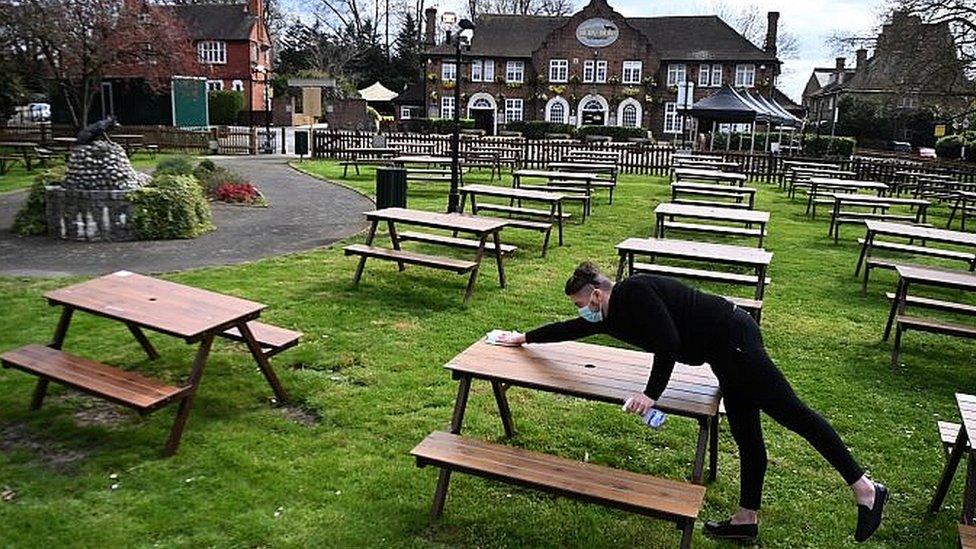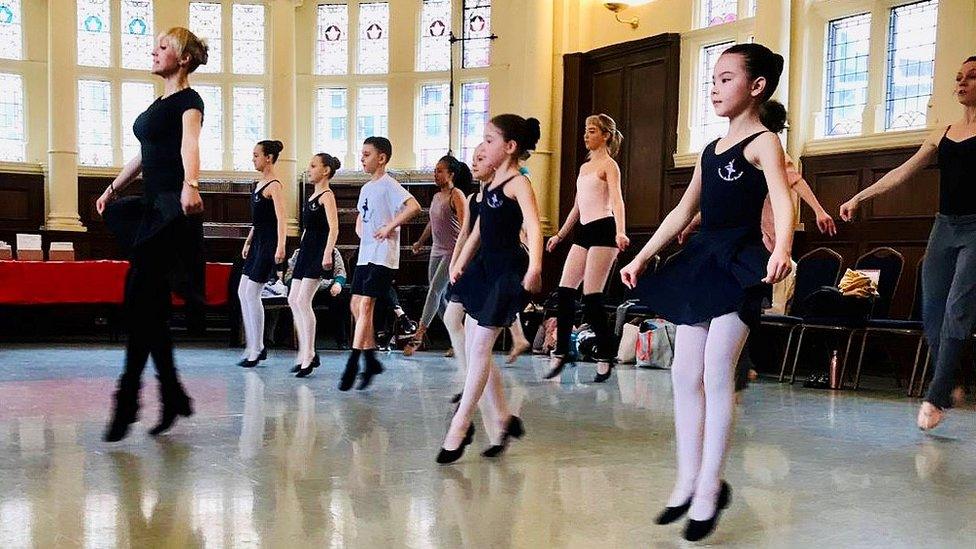'I don't want rising bills to mean kids miss out'
- Published

Julia Khoroshun wants Rishi Sunak to offer more help during the next few months
Prices are rising. Energy costs are soaring. And they're creating a nightmare for tens of thousands of small businesses, just as they're getting over Covid.
So how are they coping with the latest squeeze, not to mention the rise in National Insurance which came in this week?
"It's very worrying to think about children who will miss out on extracurricular activities because parents simply can't afford them, and how it will affect children psychologically and physically," says Julia Khoroshun.
The 40-year-old, who runs Classical Ballet Studios in New Barnet, north London, has, like many businesspeople, had a traumatic couple of years.
"Covid affected our dance school terribly, as we have lost two of our branches," she explains. "The government did help us to a degree, as we got Covid scheme grants. However, they were quite small."
Julia feels some gratitude to Chancellor Rishi Sunak for helping to keep the school going during the worst of the pandemic - when face-to-face lessons were impossible - but she's less happy about the increase in National Insurance payments.
It means both employees and businesses will be paying 1.25 pence more in the pound, with the money earmarked to help keep the NHS and social care going.
Meanwhile, bills are rising sharply, putting more pressure on Julia to increase tuition rates for almost 300 pupils, who start as young as aged two-and-a-half.
Half-Russian and half-Ukrainian herself, she has started offering free lessons to children coming to the UK in the wake of Russia's invasion.
But Julia feels that - just as business is picking up after the pandemic - she's facing new, unnecessary challenges.
"The government should consider more financial aid to businesses like ours until times have stabilised," she says.

Shona Hamilton-Higgins says firms recovering from the pandemic are fed-up
The Federation of Small Businesses estimates the NI rise alone will cost the average small firm £3,000 a year. And it says it's "very much encouraging" its members to find out if they are eligible for help.
In March's Spring Statement, Mr Sunak raised the point at which people start paying National Insurance, which he called the equivalent to a tax cut of £300 for those on more than £12,570 a year.
And NI relief for firms - the Employment Allowance - was increased by £1,000., external
But energy costs are expected to rise again by 40% in October, with overall inflation possibly passing 10% at some point in the year.
Shona Hamilton-Higgins, who runs Lilac, a human resources consultancy, supporting small businesses in and around Wisbech, Cambridgeshire, fears devastation for many.
"The NI rise is coming on top of a huge rise in the cost of living and it's adding to the worries for a lot of firms," the 31-year-old says. "It makes them think more about whether they can take more people on.
"An extra 1.25% isn't that big a deal if you're a huge company turning over £5m and with 150 employees, but it's a very different story for smaller operators. And people are having to be more selective about the work they do because of the smaller profit margins."

Pubs are open again, but how will they fare when costs rise and punters' spending power falls?
Shona says the hospitality sector - pubs, restaurants, cafes and caterers which traditionally employ high numbers of young people - is especially vulnerable, as customers cut non-essential spending.
And, with many of her rural clients having to drive to work, she's worried that the surge in petrol prices - partly offset by Mr Sunak's cut to fuel duty - could sink plans for expansion.
"Firms are just recovering from the pandemic and all this hits. People have had enough and are fed-up," she says.

Julia has started offering free ballet lessons for Ukrainian refugee children
Different political parties are offering their ideas. Labour and the Liberal Democrats want VAT on household fuel to be cut, for instance.
But Shona thinks these and other plans involve tinkering with a "massive problem" for businesses - rising costs and a slump in the public's spending power.
"I don't think anyone's really got the answers," she says. "There might be a few ideas discussed in the pub or in the café, but there's no sense of a solution.
"Politicians have to give us some better ideas."
A Treasury spokesperson said: "We have backed businesses throughout the pandemic with an unprecedented package of support."
Help included "a tax cut worth up to £1,000 for half a million businesses" through the increase in the Employment Allowance, VAT cuts, business rates holidays and government-backed loans worth around £400bn, they added.
"And we will continue to stand firmly behind them in the months ahead," the spokesperson said, adding: "We are also investing in skills, innovation and infrastructure to boost growth for the long term."